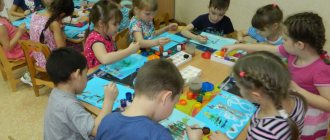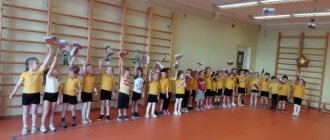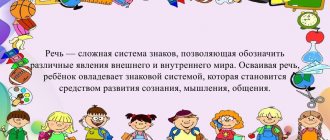MAGAZINE Preschooler.RF
Literary and speech activities in our kindergarten.Literary and speech activities in our kindergarten are held in all age groups. They are held once a month in the afternoon.
“Rhetoric + Theater” has been created on the basis of our kindergarten ; the pupils of this circle perform theatrical performances for children of younger groups. Based on Russian folk tales. “Kolobok” , “Teremok” , “Turnip” etc. T. P
Starting from the middle group, we use literary and speech leisure in the form of a quest game. Such as “Miracles in a fairy tale land” , “On the roads of fairy tales” , “Let's help the heroes from a fairy tale”
Also, during literary and speech leisure, children, together with their parents and kindergarten teachers, develop newspapers; the pupils really loved making baby books in our kindergarten. After all, this interesting activity captivates all kindergarten students. Pupils of older groups make words from letters and paste them into a little book. They independently design the publication, draw fairy tale characters, come up with continuations of fairy tales, or invent their own fairy tales.
Literary and speech leisure activities evaluate the speech development of children, to understand how all mental processes are activated, how moral qualities are formed, how cognitive processes, creativity, and intelligence of the child develop.
Also in our work we use a variety of tasks that we use in our work, for example: “Find out a fairy tale or story by a passage, illustration, objects, by a character in a story or fairy tale. “How do fairy tales differ from other literary works ? “What proverbs are found in fairy tales”
Our kindergarten also hosts speech festivals; we dedicate them to the work of children's writers. Speech festivals unite different types of arts - painting, literature, music.
In our kindergarten there are a lot of scenarios for such holidays. “My favorite toys” (based on the work of A. Barto), “Living Hat” (based on the work of N. Nosov), the holiday of “True Friends” , the holiday of “Russian folk tales” .
The main task of our holidays is to improve the speech of preschoolers and develop creative abilities.
Our students love to take part in preparations for the holidays. Pupils show great interest in acting out skits and love to recite poems. They take great pleasure in making up fairy tales.
Also in our kindergarten there are intellectual and speech games in the form of quizzes, competitions, tournaments, and Olympiads.
We also have original leisure scenarios for pupils of the preparatory school group “Magic Country” , “On the Path to Fairy-tale Heroes” .
After all, such games are important for the development of a preschooler’s intelligence. We hold intellectual competitions between pupils of children of the same age, as well as between kindergartens.
In our kindergarten we attach special importance to holidays with the participation of parents and children. We have a lot of holidays with our parents, for example: “Mom’s Tales” , “In the Country of Summer Residents and Gardeners” , “Chocolate Day” , “Mom Dad I’m My Friendly Family” . Holidays with the participation of parents show that there is an atmosphere of mutual understanding, joint creativity, and friendship.
Our creative work helped develop preschoolers’ motivation for knowledge and creativity, and the formation of a positive image. We have created all the necessary conditions for meaningful leisure time for children in kindergarten, and the role of parents in the upbringing and development of preschoolers has increased significantly.
| Next > |
Literary entertainment based on the fairy tales of K. I. Chukovsky: “Visiting Grandfather Korney”
(middle and senior groups)
Goals:
- Recall with children the names and contents of the works of K.I. Chukovsky, with which they became acquainted, awaken in children the joy of meeting their favorite fairy-tale characters, and develop their imagination.
- To develop the ability to determine the content of literary works from excerpts from books and illustrations.
- Encourage them to “help” the heroes of these works - to recite familiar poems with them, using intonational means of expressive speech.
Preliminary work: reading fairy tales by K.I. Chukovsky “Telephone”, “Doctor Aibolit”, “Fly-Tsokotukha”, “Fedorino’s grief”.
Progress:
Educator. Guys, do you believe in miracles?
Children: yes!
Educator. A real miracle happened in our group this morning!
- Do you want to see?
Children: yes!
Educator. Then close your eyes and don’t peek (the children close their eyes, the teacher takes out the Queen book).
– Now open your eyes and look. Did you see a miracle? See, this is Queen Book, how beautiful she is? Do you like her? (Yes). Let's open it and take a look at the first page. What's on the first page? Here, guys, are the rules for handling the book.
Children:
- Take books with clean hands.
- Books cannot be torn.
- Books must not be crushed.
- You can't draw on books.
- You can't bend corners.
Educator. Well done boys! Know how to handle a book correctly.
– But the Queen of Books tells us one more golden rule that we must remember: “Books love silence,” so you cannot talk loudly, make noise or play around, you must be attentive, if you want to say or answer something, you must raise your hand. Everyone, remember this rule? (Yes).
– How should we behave?
Children: quiet.
Educator. Now we can look at the next page, what's there?
– Who is this guys? (Korney Ivanovich Chukovsky).
– Today the Queen of Books invites us to visit your most beloved writer, whom both adults and children love, Korney Ivanovich Chukovsky.
- Grandfather Korney invites all the children to visit! But he is especially glad to invite such children, who know how to listen to fairy tales or like to read them. - Do you want to visit? (Yes). Then, let's go.
Children pass and sit on chairs).
On the table is a portrait of K.I. Chukovsky and books with his works.
Educator. So, we came to visit. Here we are already waiting for books written by K.I. Chukovsky.
Educator. Today, with the Queen's book, we will remember the fairy tales of K.I. Chukovsky.
– Guys, do you remember how K.I. Chukovsky started writing fairy tales? (No).
“Then I’ll remind you.”
– Korney Ivanovich Chukovsky lived a long time ago, when your grandparents were as small as you are now.
He had four children: two daughters and two sons. He loved them very much, often played hide-and-seek and tag with them, swam in the sea with them, took them on boat rides, and built fairy-tale sand castles with the children. They lived amicably and cheerfully.
But one day a misfortune happened. One of his sons (a little boy) became seriously ill. He had a high fever and a severe headache. The boy did not eat anything, could not sleep, and only cried.
Chukovsky felt very sorry for his son, he wanted to calm him down, and he began to invent and tell him a fairy tale as he went. The boy liked the fairy tale, he stopped crying, listened carefully and finally fell asleep, and after a few days he completely recovered.
After this incident, Korney Ivanovich Chukovsky began to compose fairy tales. And he came up with many fairy tales that children and adults know and love well.
- Do you like fairy tales?
Children: yes.
Educator. What tales of K.I. Chukovsky do you know?
Children. “Telephone”, “Doctor Aibolit”, “Moidodyr”, “Fly-Tsokotukha”, “Fedorino’s grief”.
Educator. Well done, you know a lot of fairy tales.
– Let’s see what’s on the next page of the Queen’s book (turns the page, on it is an excerpt from “Moidodyr”).
“The blanket ran away, the sheet flew away, and the pillow, like a frog, jumped away from me. I am for a candle, A candle - in the stove! I’m for a book, but I’m running and jumping under the bed!” - Guys, did you find out what fairy tale we are talking about?
Children. “Moidodyr”.
Educator. Who will show me this book, where it is? (One of the children shows “Moidodyr” among the books on display).
- How did you guess? (Moidodyr is drawn on it.)
- That's right guys, from the illustration on the cover of the book we can determine who or what this book is about, the drawing helped us.
– Who is this fairy tale about? (Children's answers.)
– Korney Ivanovich Chukovsky really didn’t like children who didn’t wash their hands or wash themselves. He wrote a fairy tale about such dirty people, which is called “Moidodyr”
– What’s on the next page of the Queen’s book?
- There are riddles here, guys. You need to choose any number, I will tell you a riddle under this number. If you guess right, a window will open.
- He sleeps in a den in winter under a huge pine tree, and when spring comes he wakes up from sleep (Bear).
- A cunning cheat Red head A fluffy tail - beauty And her name is... (Fox).
- Here are the needles and pins crawling out from under the bench. They look at me, they want milk (Hedgehog).
- A ball of fluff. A long ear. Jumps deftly Loves carrots (Hare).
Educator. Well done boys. You have completed the task. Look, a guest has come to us. Do you know who this is?
Children. This is Fyodor’s grandmother from the fairy tale “Fedorino’s Grief.”
Educator. What does this fairy tale teach us?
Children. Be neat, clean, take care of the dishes, wash them.
Dramatization of an excerpt from the fairy tale “Fedorino’s grief.”
Educator. Let's take a look at the next page of the Queen of the Book and see what else she has in store for us.
- And here is the game “Say the Word.” I will read the beginning of the line, and you continue.
Good doctor……….(Aibolit)! He is under the tree ………..(sits) Come to him for treatment. Both the cow and …………..(she-wolf). And a bug, and ………………(worm), And a bear! He will heal everyone, he will heal Good…………………(Dr. Aibolit)!
Educator. Did you enjoy playing? What fairy tale are these lines from?
Children. Yes! From the fairy tale “Doctor Aibolit”
PHYSMINUTE
Dr. Aibolit . Hello. Did you call me? Should I treat you?
Educator. Let's stand in a circle and show Dr. Aibolit that we are healthy, there is no need to treat us.
You don’t need to treat us, Good Doctor Aibolit. We will run and walk, We will gain strength. Our tummies don’t hurt like poor hippos. We will stretch our hands to the sun, And then we will sit down on the grass. Like eagles we fly, we soar, we look in all directions, where is Africa - the country? Maybe they need help there? Together with Chita we will jump, like a cheerful, ringing ball. Skok-skok, skok-skok, Don't cling to a twig. Children will walk through the grass in a friendly manner towards the poor ostrich chicks. They will raise their legs and walk through the thick grass. We helped everyone and became strong ourselves.
“That’s how strong and healthy we are.” Sit down, guys.
Game situation “At an appointment with Doctor Aibolit” (children with their favorite toys come to an appointment with a doctor to check their health)
Educator. What's on the next page of the Queen's book? (Phone and bear)
- Do you want to revive her? (Yes).
-I will turn you into wizards now. Close your eyes and don't peek. Make a wish and say it to yourself so that the picture comes to life (music plays and we turn the child into a Bear. When the music ends, the children open their eyes).
- Guys, our picture has come to life.
Dramatization of an excerpt from the fairy tale “Telephone”
Educator. Guys, tell me, what fairy tale did this heroine come to us from?
Today I am waiting for a gift, Today I am the birthday girl. I went to the market, I bought a samovar. I’ll treat my friends to tea, let them come in the evening.
Children. From the fairy tale “Tsokotukha Fly”.
Educator. Guys, Korney Ivanovich loved children very much, he often came to the children to read his funny poems and fairy tales. Guys, look how many fairy tales K.I. wrote for us. Let’s name them again (they list them).
- Why do you guys like these fairy tales?
Children. Because they are kind, funny, interesting, instructive.
Educator. What do fairy tales teach us?
Children. Be kind, neat, polite.
Educator. Thanks to K.I. Chukovsky for the wonderful fairy tales. And now the Tsokotukha Fly invites us to visit for tea.
(Tea drinking and a sweet table are organized for children)



